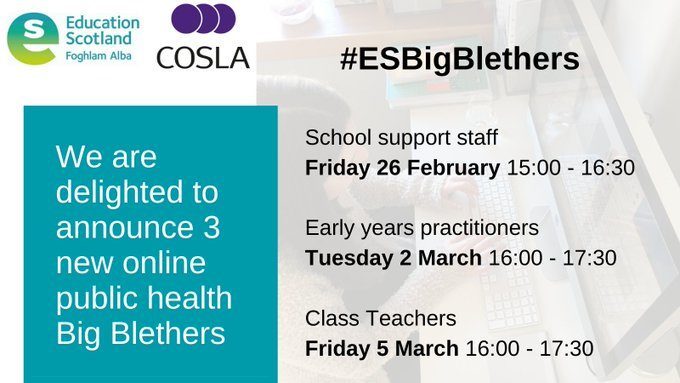Education Scotland and COSLA are hosting 3 online public health Big Blethers in February and March. You can get more information and sign up here.


Education Scotland and COSLA are hosting 3 online public health Big Blethers in February and March. You can get more information and sign up here.
16th March 2021 at 3pm
We look forward to welcoming you to our first ‘Early Years Exchange’ event for Early Years practitioners which will kick off a series of Literacy focussed sessions providing the opportunity for FVWL colleagues to share good practice and build a collaborative network.
In this session we will hear from two colleagues on how they have helped develop Literacy outdoors and build a culture promoting reading for enjoyment.
Literacy Outdoors: Reading areas are not all about cosy cushions, ivy and fairy lights. Sometimes they are repurposed tyres, swaying grass and a big dose of fresh air!
Building a Reading Culture: Developing children’s early literacy skills through play-based learning, combining practitioners’ knowledge and understanding with fun-filled family engagement.
Join us either via CPD Manager or by emailing RIC Literacy PT Chiara Sportelli: sportellic14s@glow.sch.uk
CLPL webinar on 15th February at 2pm
This session which is aimed at support staff will equip you with skills designed to engage reluctant readers and improve confidence. A structured approach to paired reading will be provided from choosing reading material through to discussing the text after reading.
Sign up via CPD Manager or contact Chiara Sportelli at sportellic14s@glow.sch.uk for further details.
Introduction to Disciplinary Literacy Webinar : 28/1/21, 4-5 p.m.
Improving Literacy in Secondary Schools recommends prioritising ‘disciplinary literacy’ across the curriculum. Disciplinary Literacy is a subject specific approach that supports raising attainment and closing the gap via enriched literacy practices across the curriculum. This introductory session highlights research on what works in vocabulary and comprehension teaching for subject disciplines, teaching pupils to read, write and think in subject appropriate ways
Please sign up via CPD Manager or contact CLjadam@glow.sch.uk to arrange a date for your school or department.

 Join educators from across Forth Valley and West Lothian Regional Improvement Collaborative for a wee blether about how Microsoft Teams has been used across the curriculum. Share what’s worked for you and your learners
Join educators from across Forth Valley and West Lothian Regional Improvement Collaborative for a wee blether about how Microsoft Teams has been used across the curriculum. Share what’s worked for you and your learnersAre you teaching using Microsoft Teams? Are you wondering how others are using the features of Microsoft Teams with their learners?
Then why not join in a chat with colleagues doing likewise from other schools in Forth Valley and West Lothian Regional Improvement Collaborative (Clackmannanshire, Falkirk, Stirling and West Lothian) – share what’s worked for you and your learners, and hear from others.
Join educators from across FVWL RIC for a wee blether on how Microsoft Teams has been used across the curriculum. Share what’s worked for you and your learners. The conversations will be facilitated by Education Scotland and FVWL RIC digital officers. There are different sessions for educators to choose depending on whether your pupils are first level, second level, third level or fourth level, so you can join in whichever sessions suit you.
A Glow login is required to join these sessions. They will take place on Glow, in the FVWL Webinars Digital Learning and Teaching channel in Microsoft Teams. Just sign up at the link below for your choice of session, and joining details will also be sent to you to confirm your place:
First Level Teams Wee Blethers – Monday 9 November 4.30pm-5.30pm –  https://www.eventbrite.co.uk/e/126305125029
https://www.eventbrite.co.uk/e/126305125029
Second Level Teams Wee Blethers – Thursday 12 November 4.30pm-5.30pm – https://www.eventbrite.co.uk/e/126314781913
Third Level Teams Wee Blethers – Monday 23 November 4.30pm-5.30pm – https://www.eventbrite.co.uk/e/126315088831
Fourth Level Teams Wee Blethers – Thursday 26 November 4.30pm-5.30pm – https://www.eventbrite.co.uk/e/126315475989
We are pleased to share that we have completed our Early Level Numeracy Recovery Programme. This programme can be used for the teaching of pupils in P1 and as a small group intervention for P2.
Please find below, information about the course and the webinar which introduces it –

We are delighted to confirm a series of Stephen Graham webinars for FVWL primary and English teachers on 28th May, 4th and 11th June (9.30 – 11am). Please sign up by email: CLjadam@glow.sch.uk
Reciprocal reading is a structured approach to teaching strategies (questioning, clarifying, summarising and predicting) that students can use to improve their reading comprehension. The strategy is based on robust research examining what effective teaching and learning in literacy looks like and practitioners will develop a deeper understanding of pedagogical approaches that engage learners and lead to improved outcomes.
Glow Blogs uses cookies to enhance your experience on our service. By using this service or closing this message you consent to our use of those cookies. Please read our Cookie Policy.